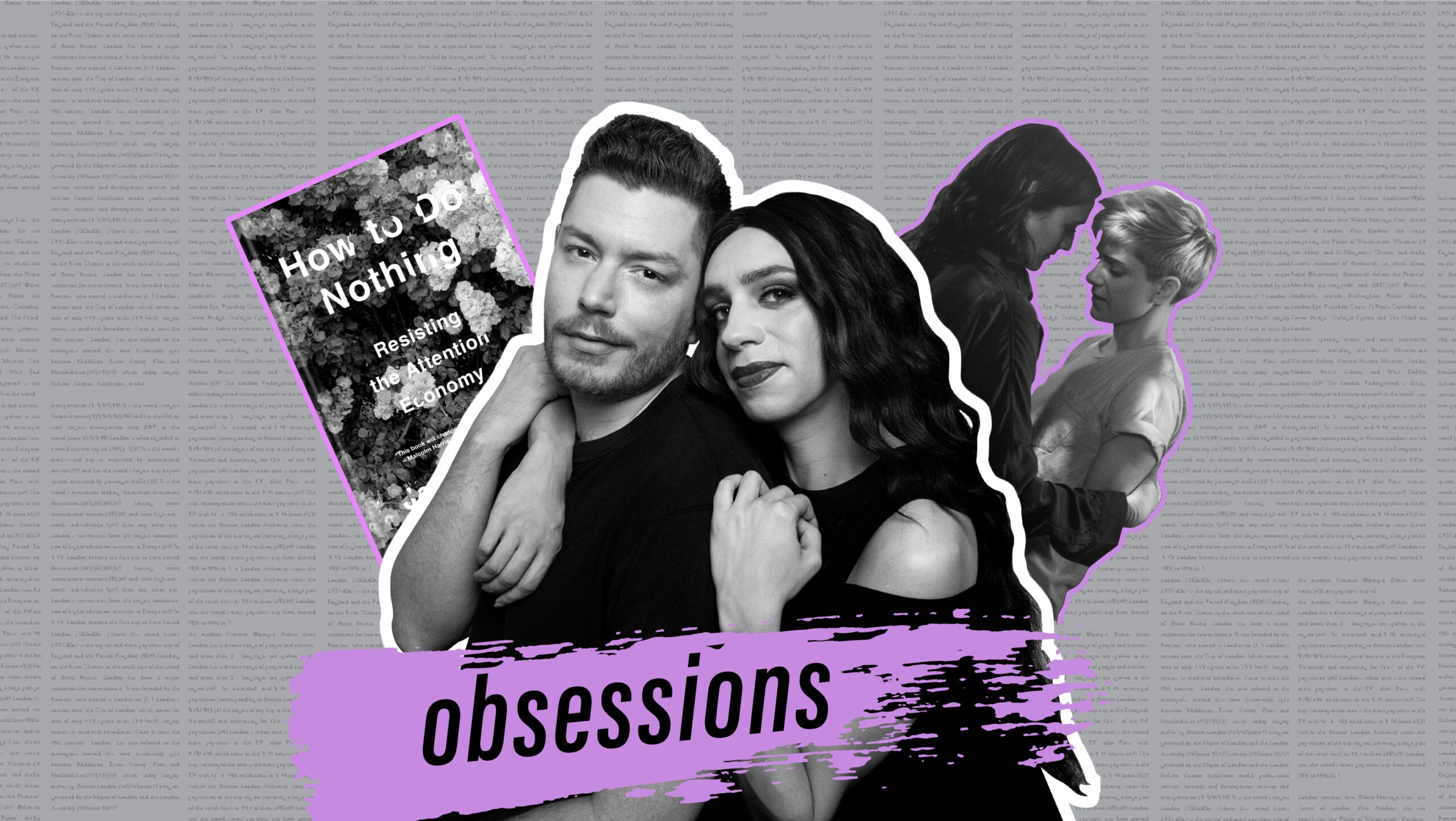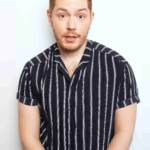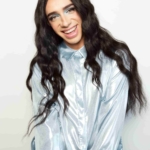Obsessions celebrates the pop culture fixations of queer, cosmically-destined BFFs Thomas Leblanc and Tranna Wintour, hosts of the CBC podcast Chosen Family.
I am aware of the irony of recommending a show called Feel Good at a time when it seems impossible to feel good at all. But these are unexpected times, so hear me out. The new six-episode Netflix series follows Mae (Mae Martin), a transplanted Canadian stand-up comedian and recovering addict now living in England, whose world is turned upside down when she falls in love and quickly moves in with George (Call the Midwife’s Charlotte Ritchie), a posh straight girl who’s never been in a relationship with another woman.
Being a stand-up comedian myself, I’m not usually drawn to shows about us. They’re always a little off in the way they portray the comedy world, which is difficult to capture and fictionalize. A comedy written for a fictional character to perform is rarely funny, and it’s weird to watch audiences laugh at a material that just isn’t good. It’s the reason why I can’t get into The Marvelous Mrs. Maisel.
But where so many shows have failed, the semi-autobiographical Feel Good triumphs because Martin has done something very few comedians do when given the chance to build a show around their lives: She’s managed to be radically vulnerable. Her character Mae is needy and wounded. She obsessively texts the closeted George and skips out on her 12-step meetings, along with her eccentric sponsor Maggie (Sophie Thompson), while telling herself she has her drug addiction under control (she doesn’t).
Co-created by Martin and playwright and TV writer Joe Hampson, and beautifully directed by Ally Pankiw (Schitt’s Creek, Shrill), Feel Good is not the show you’d expect from someone as funny as Martin, whose comedy is personal and relatable. The show leans more into drama than it does comedy, and has much more in common with The L Word and Tales of the City than it does with any sitcom. The world of the show is intimate and Martin doesn’t shy away from painfully real love scenes and challenging themes such as addiction, emotional abuse, trauma and identity. Mae’s stand-up is only featured when it’s an actual part of the story. I love that Martin was not afraid to be unfunny (which is most comedians’ biggest fear). And I love it when we get to see a different dimension of the people who make us laugh.
The comedy in the show is mainly supplied by Lisa Kudrow, who plays Mae’s mother, Linda. It is criminal that Kudrow is mostly known for the worst show of all-time, Friends, because she is truly one of the great comedic actresses of our time. (Sidenote: If you have never seen Kudrow in The Comeback, you are missing out on a masterpiece.) Linda is introduced through a series of funny Skype chats as a cold, selfish and out-of-touch mother. She’s almost as severe as her no-nonsense blonde bob. She is completely dismissive of Mae’s emotional needs and their relationship is strained. I won’t spoil anything, but there is an episode where Linda and Mae have a major confrontation in a haunted house and it is one of the most poignant and hilarious scenes I have seen in a long time. Martin’s talent for balancing the devastating with the hilarious is completely refreshing.
I already find it strange to watch shows where people go out to crowded parties, bars restaurants and stores, where no one talks about COVID-19. As we all face the reality of isolation, we can’t distract ourselves from the truth of who we are in the ways we once easily did. That’s why Feel Good feels so relevant to the current moment: Mae is constantly trying to escape the truth, to uphold a version of herself and her life that is in opposition to reality. But if there is any hope for her to be in a healthy relationship, she must confront her demons. As we prepare for increasingly strict social distancing, we will all be confronted with ourselves and our ability to get comfortable with the uncomfortable. It’s not going to always feel good, but I believe it can be transformative.
— Tranna Wintour

When I woke up on Saturday two weekends ago after all bars had been called to close in Montreal, my new reality started to sink in. Nightlife, and the community and income it provides, wouldn’t be a part of my life for weeks, if not months. As a performer, event producer and, hum, DJ, I also rely on social media to spread the word about what I’m doing. But, I thought, with all events on hold, maybe now is my chance to take a break from social media?
Like most people I know, I wish I didn’t stare at my phone as much as I do. So, in addition to social distancing, I’ve decided to practice social media distancing: I deactivated Facebook and deleted Instagram from my phone. Our apps are a great way to connect, but for me, social media can also be a pit where I pour my precious mental energy with very little to show for it.
Alone in my living room with no feeds to scroll, I’ve noticed something: I own way too many books. Browsing a bookstore is a great way to spend time, but I also got used to the unsustainable luxury of having books delivered to my door in 24 hours. The result? Dozens of unread titles sitting in piles around my living room, waiting for me to pick one. Years of browsing the internet have made it much harder for me to focus; I don’t read as many books as I buy.
One of those books is Jenny Odell’s 2019 bestseller How to Do Nothing. I don’t remember buying it, but I know why I probably did: The cover is designed to look like the book is wrapped in a beautiful picture of roses. The title, too, is right up my alley. As a reluctant user of social media and a self-confessed over-doer, I am drawn to any writing that tells me I don’t need to do as much as I do. Quarantined with time on my hands, I picked it from the pile.
Odell is a California-based artist, teacher and writer who, like most of us, experiences digital fatigue. In How to Do Nothing, she recalls how the “attention economy” has driven us to capitalize on every waking hour. Not only do we need to be productive, but we also need to tell the world that we are.
Through an ingenious mix of personal anecdotes, philosophical wisdom and insight from other artists, she dissects our individual and collective impulse to always do more and live with an urgency that’s frankly unnecessary. How to Do Nothing is more than a guide to putting down our phones. It’s a manifesto to take back our attention and resist the social pressure to constantly distract ourselves.
Odell writes: “But beyond self-care and the ability to (really) listen, the practice of doing nothing has something broader to offer us: An antidote to the rhetoric of growth. In the context of health and ecology, things that grow unchecked are often considered parasitic and cancerous.” In the middle of a pandemic, these last words are haunting: What if the enemy wasn’t COVID-19, but the connected hypercapitalism that is now collapsing under its own weight?
I’m not doing a digital detox in the hopes of being more productive when I can throw events again. I’m not done reading it yet, but in Odell’s style I found comfort and confidence to accept that our world doesn’t need to return to what it was “before.” This book, and this quarantine, are changing me. I love to take things slow, for once. We need a new way of living our lives, and these days it feels like everything is on the table.
— Thomas Leblanc



 Why you can trust Xtra
Why you can trust Xtra


